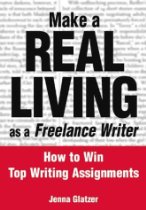Archive for the ‘freelance writing week’ Category
Freelance Writing Week: How to Find Freelance Writing Jobs: Job Ads and Cold Calls
Welcome to the final day of Freelance Writing Week! So far we’ve covered:
- Is Freelance Writing For You?
- Freelance Writing Resources
- 5 Tips for How to Find and Develop Your Freelance Writing Niche
- How to Find Freelance Writing Jobs: Query Letters
 Now it’s time to talk about two other ways you can find freelance writing jobs: job advertisements and cold calls.
Now it’s time to talk about two other ways you can find freelance writing jobs: job advertisements and cold calls.
* Job advertisements *
Another way to find freelance writing jobs is by scouring job advertisements. This is my preferred method, and it’s the way I’ve had the most success. You’re looking for jobs in your niche(s), and also those in your experience level and desired pay range.
Job ads may be looking for someone to write a specific piece or to become a regular writer; whether you or the editors will come up with story ideas varies by publication.
When responding to ads, you’ll need something like a cover letter—although it may not really “cover” anything as many employers don’t ask for resumes. Regarding resumes, I say don’t send one unless it’s requested; in fact, avoid sending attachments at all unless requested.
In your response, summarize the highlights of your resume in a three or four paragraph e-mail. My e-mails in response to job ads generally go like this:
1st paragraph: Tell them where I saw the ad and one sentence as to why I’m perfect for the job.
2nd and possibly 3rd paragraph: Specific qualifications for job (education, previous writing credits, organization memberships, other work experience).
Last paragraph: Thank them for their time and consideration, etc.
I recommend keeping this e-mail short and sweet—not so short that you don’t explain why they should hire you, but not so long that the reader gets bored halfway through either. People hiring writers generally want someone who can say a lot in a short space, and the place to start proving you can do that is in your introductory e-mail.
My personal tip: if you have previous writing credits you think would help land the job, link to them even if they didn’t ask for them; I firmly believe people are naturally click-curious when they see links. On that note, be sure to include links in your e-mail signature, even if it’s only to your personal blog.
Some of my favorite online job sites:
- About Freelance Writing
- Freelance Writing Jobs
- Morning Coffee Newsletter from Freelance Writing
- ProBlogger Job Board
I personally have never used paid services like Elance or Guru, but I have freelance friends who have and have enjoyed success with them–just be willing to dig for good clients, I’m told.
* Cold calls *
 This is what I call letters (or, more likely e-mails) to publications offering to write for them. This is slightly different from query letters as you’re pitching yourself in general as opposed to offering particular ideas, but they’ll actually read pretty similarly.
This is what I call letters (or, more likely e-mails) to publications offering to write for them. This is slightly different from query letters as you’re pitching yourself in general as opposed to offering particular ideas, but they’ll actually read pretty similarly.
For example, let’s say that I come across a site selling property in Calabria that severely lacks information on the region. They aren’t advertising for writers, and I don’t know if they’d even hire any, but I think, “Hey, I wonder if they could use someone like me?”
So I whip off an e-mail explaining I’m a full-time freelance writer who has lived in Calabria for nearly six years and built a successful website largely based on my experiences here. I include links to a few of my best posts most tailored to their site, perhaps offer photographs, cross my fingers, and wait.
You probably won’t see *huge* success with this method, but you never know, so why not give it a try?
This is yet another reason why I think aspiring freelance writers can benefit by having a blog—even if you don’t have writing credits per se, at least you have something out there somewhere.
My writing career picked up significantly right around the time I started gaining blog readers; it could be merely a coincidence, a function of my confidence level rising, or maybe employers saw me as a more serious writer. Whatever it was, it worked, so I highly recommend it.
So now that I’ve led you to job sources, it’s time to talk money, but we’re out of time for Freelance Writing Week. We’ll take a break from freelance writing tips next week, and the following week is Easter, which means special holiday posts. So right now it looks like Freelance Writing Week II will be April 13-17. Don’t worry—I’ll remind you!
What is your preferred method of finding freelance writing work?
Thanks so much for reading all week!
Buon weekend!
Freelance Writing Week: How to Find Freelance Writing Jobs: Query Letters
Welcome to Day 4 of Freelance Writing Week! So far we’ve covered:
- Is Freelance Writing For You?
- Freelance Writing Resources
- 5 Tips for How to Find and Develop Your Freelance Writing Niche
 Finally we’re at the point where you’ve all wanted to be since Day One. It’s time to go job hunting!
Finally we’re at the point where you’ve all wanted to be since Day One. It’s time to go job hunting!
As I prepared this post, I realized it became too long for just one day, so I’m splitting it up into two posts, which means we’re simply going to have to Freelance Writing Week II—all about money.
I already have five post ideas about freelance writing pay to fill up the week, but if you have specific questions, please include them in the comments so I can address them as well.
Now, back to:
How to Find Freelance Writing Jobs
First of all, please note that a lot of your time as a freelance writer will be spent finding work, at least when you’re starting out. This is just something you *have* to make time for, plain and simple. Until you get your name out there and established, the work isn’t going to find you.
There are essentially three ways that you can find work as a freelance writer:
1. Query letters
2. Job advertisements
3. Cold calls
Today we’re talking queries.
Also, note that for our purposes, we’ll be discussing finding work writing articles and/or blog posts. If you’re pitching a novel or nonfiction book, the process is very different; perhaps we’ll get to that someday, but for now, let’s get started with:
* Query Letters *
Queries are letters that you send to publications to pitch ideas for articles and/or blog posts.
How do you write query letters?
Confession: I don’t really do query letters (more on this in a bit).
But since that doesn’t help you at all, I will tell you that generally a query letter should have six parts, according to Jenna Glatzer’s Make a Real Living as a Freelance Writer:
1. Salutation. That is, “Dear Ms Editor’s Last Name:” Try to avoid the general “Dear Editor” if possible, and also be sure to use a colon as that is proper formal letter punctuation.
2. Hook. Lead with a punch, something snappy and interesting that will catch the editor’s eye and make her curious to read more.
3. Synopsis. Concise summary of what you plan to write about in the article.
4. Offering. What you can give the editor, e.g., an 800-word article plus photos.
5. Qualifications. Whatever writing and/or life experiences you’ve had that make you qualified and the best person to write this article. Note: if you’re not published yet, don’t call attention to it/
6. Call to action. Something like “Thanks for your consideration, and I look forward to your response.”
Can you share sample query letters?
Again, since I don’t really do them, I don’t have any personal examples to share, but I will send you to Appendix A of Jenna Glatzer’s Make a Real Living as a Freelance Writer where she generously includes letters that landed her assignments. By the way, are you convinced yet that you should find a copy of this book?
Also check out:
- Sample Query Letter at About.com Freelance Writing
- Sample Query Letter at About Freelance Writing
- Sample Query Letter by Moira Allen
 Are query letters really important?
Are query letters really important?
Query letters are generally *the* way to break into print publications.
Some of you have asked about the differences between writing for online and print publications, and while one big difference used to be that print publications pay more, times they are a-changing (look how many print publications are folding or going online these days!), so even that isn’t necessarily true anymore.
The two biggest differences, I’d say, are:
(1) turnaround is much quicker online (tighter deadlines but faster pay and publication); and
(2) formalities (online publications are generally less fussy with formalities; some print pubs *still* don’t accept e-mail queries).
Do you do query letters?
As I’ve stated above, I really don’t do query letters; just about all of my work has either come from answering job advertisements, by the work finding me, or through continued relationships with editors where I write “query” e-mails like “How about topic xx? I’d include a, b, c, etc.”
Why don’t I bother with queries? Writing query letters takes quite a bit of time and research at the front end, and I just haven’t had much luck with the few I’ve done. For me the process was too time-consuming for very little (no) reward, but if the right idea came to mind, I’d certainly query it up.
Final Note on Pitching Articles
For the record, generally you should avoid preparing an article first and then trying to pitch it; you might very well be wasting valuable time working on something that will never get published (unless you want to use it on your blog or as a guest post somewhere, of course).
Now be sure to come back tomorrow when we’ll talk about finding freelance writing jobs by answering job advertisements and making cold calls.
If you haven’t already, be sure to subscribe through an RSS feed so you don’t miss a single Freelance Writing Week post.
Also free free to bookmark, Stumble, and share these posts with friends via email, your blog, and Twitter. The more people we have reading them, the more ideas and suggestions we can come up with in the comments. We freelance writers have to stick together!
Have you ever written a query letter? What’s your technique?
Freelance Writing Week: 5 Tips for How to Find and Develop Your Freelance Writing Niche
Welcome to Day 3 of Freelance Writing Week! So far we’ve covered:
 Now it’s time to talk about how to find and develop your freelance writing niche.
Now it’s time to talk about how to find and develop your freelance writing niche.
But you may be asking yourself whether you really need a niche.
Look at this way: You’re an editor looking for someone to write an technical article on iPhone applications. One applicant has a long list of writing credits about technology and the other has clips all about Hollywood gossip and fashion.
Sure it’s entirely possible the gossip/fashion writer knows a lot about iPhone applications, but which writer would you go with?
That’s why you need a niche.
You want to be *the* person an editor thinks of when an assignment in your niche comes up, and you also want your readers to trust what you’re writing because, hey, you’re an expert!
Now you don’t need to focus so narrowly that you put yourself out of the running for many gigs, and you certainly don’t need to stick with only one niche. Look at me, for example. I’m an attorney who lives in Italy. Right there that gives me two big possible niches:
1. Law/law school: I write for LegalZoom and am the About.com Guide to Law School.
2. Italy: I write for Italy Magazine, easyJet, and Italian Notebook.
I could also write about expat life if I so choose, although that’s something I’ve really only touched on here at Bleeding Espresso. Hmm….
So that brings us to the first of:
5 Tips for How to Find and Develop Your Freelance Writing Niche
 1. Make a list of words that define you.
1. Make a list of words that define you.
Sounds kind of cryptic, but all I really mean are things you are or like to do such as “mom,” “former cheerleader,” “engineer,” “cyclist,” “antique dealer,” etc. The old adage is “write what you know,” and that’s never more true than in narrowing down your freelance writing niches.
There are writers’ markets for just about every niche you can imagine, so be as comprehensive as you can when listing your areas of expertise.
2. Make a list of things you’re interested in learning more about.
OK, we’re already straying from “write what you know,” but I think this is worth exploring. Just because you’re not an environmental scientist doesn’t mean you can’t write intelligently on the environment, right? You can learn more *and* get paid to do it as well.
See Tip #5 for more on how to become an expert on something you are only currently learning about.
3. Make a list of the publications, websites, and blogs you like to read.
What do they talk about? Could you talk about it too? Chances are a lot of these topics will overlap with those in the first two lists you’ve made–that’s a good thing because it means you’ve been researching your niches all this time and you didn’t even realize it.
Also, be sure to keep this list as it’ll come in handy when it’s time for you to explore potential writing markets.
4. Find publications, websites, and blogs that focus on the topics you’ve listed so far and read them regularly.
The more informed you are about your niche, the better. Not only will you be up to date on the latest developments and information, you’ll also get a feel for the way articles and posts are written in your niche.
For example, a beauty care tip blog most likely isn’t written in the same way a political blog would be. Allow the different styles of writing to seep into your subconscious so it will be easier for you to write similar pieces later.
By now you’re probably thinking, fine! Niche! Got it! Now when do we get to *write*? Right now.
Or, if the subject matter flows, start using your existing blog to start testing the waters of your niche. This is an especially useful tip if you don’t have any writing credits in a particular niche or any writing credits at all. Brand spanking newbies, I’m talking to you!
For now, don’t worry about readership (although that’s a nice bonus). What you’re really looking for is a platform in which to publish your writing to start getting you recognized as an expert in your niche; at the very least, you’ll have somewhere to point potential employers when they want to see samples of your writing. I know many say they want “published” samples, but hey, published on your blog is better than nothing at all, isn’t it?
Now this tip also works for more established freelance writers as well. If you’re ready for a new niche but are having trouble breaking in, write about it on your blog.
For example, I’ve recently started the Going Green series here at Bleeding Espresso. I don’t think I’ve published anything particularly “green” anywhere else, but now if I want to apply for, say, an environmental blogger position somewhere, at least I’d have something to back that up.
And in case you’re wondering, yes, I *have* gotten job offers purely based on my blog (including one from Publishers Weekly that I couldn’t do because they won’t send books abroad…boo!), so never underestimate the power of a blog.
And hey, at the very least, through your blog, you’ll be working on your writing skills–and that’s never a bad thing.
OK, I think we’re finally ready to go job hunting, don’t you? Come back tomorrow for How to Find Freelance Writing Jobs!
If you haven’t already, be sure to subscribe through an RSS feed so you don’t miss a single Freelance Writing Week post.
Also free free to bookmark, Stumble, and share these posts with friends via email, your blog, and Twitter. The more people we have reading them, the more ideas and suggestions we can come up with in the comments. We freelance writers have to stick together!
What do you think your niche(s) are or might be?
Freelance Writing Week: Freelance Writing Resources
You’ve read yesterday’s Freelance Writing Week post, Is Freelance Writing For You? and you’ve answered a resounding “Yes!”
So now what?
Well before you start looking for jobs, I highly recommend doing a bit more research about how freelance writing works. You’re off to a great start by following Freelance Writing Week here, but let me point you to some of my favorite freelance writing resources in print and on the web:
My Favorite Freelance Writing Resources
Freelance Writing Books
- Make a Real Living as a Freelance Writer by Jenna Glatzer. Hands down my favorite freelance writing book. Glatzer breaks down each and every part of freelance writing in simple and easy to follow chapters; her writing is clear, entertaining, and best of all, inspiring. I find myself going back to this book periodically whenever I need to get re-motivated to continue freelance writing–and it always delivers.
- The Street Smart Writer: Self Defense Against Sharks and Scams in the Writing World by Jenna Glatzer and Daniel Steven. Another great one by Glatzer with straight-forward advice, this time on the business end of writing. Excellent tips on how to protect yourself and your work.
- 2010 Writer’s Market by Robert Lee Brewer. Markets, book publishers, agents, and lots of advice from successful writers. The 2010 version will be published in June, but if you can’t wait, the 2009 version is still available.
- On Writing by Stephen King. This one isn’t necessarily about freelance writing, per se, but it’s one of the best books on writing in general out there. Period.
Also be sure to check out the “Writing” category in my Amazon store for more great writing books.
Freelance Writing Websites
- About.com Freelance Writing: pages upon pages of awesome advice on every aspect of freelance writing by Allena Tapia.
- About Freelance Writing: Anne Wayman‘s blog in which she shares what she has learned as a copywriter, ghostwriter, blogger, e-book author, and more. Great job lists too.
- AbsoluteWrite.com: started by the aforementioned Jenna Glatzer; be sure to check out the forums in particular.
- Freelance Writing Jobs: Deb Ng‘s amazing collection of articles and advice on all different types of freelance writing; great job lists as well.
- WOW! Women on Writing: “an e-zine promoting the communication between women writers, authors, editors, agents, publishers, and readers.” Fun place too!
- WritersWeekly.com: Angela Hoy‘s site with lots of great articles, but especially helpful are the forums, namely “Whispers and Warnings,” which tells you which clients to avoid.
There are really lots of writing sites I love, but these are the absolute best, IMHO. I also have favorite writing books, which you can see in the writing section of my Amazon store.
Now I’m not saying you should read all of these straight-through before you dive into freelance writing, but a quick look around them will certainly help you get a feel for the business. All of these are great to keep coming back to again and again whenever you need a particular piece of info, advice, etc., so be sure to bookmark!
Now be sure to come back tomorrow when we’ll talk about How to Find Your Freelance Writing Niche!
If you haven’t already, be sure to subscribe through an RSS feed so you don’t miss a single post of Freelance Writing Week!
Also free free to bookmark, Stumble, and share these posts with friends via email, your blog, and Twitter. The more people we have reading them, the more ideas and suggestions we can come up with in the comments. We freelance writers have to stick together!
Please share your favorite writing resources in the comments!
Freelance Writing Week: Is Freelance Writing For You?
Welcome to Freelance Writing Week at Bleeding Espresso!
 If you’re interested in freelance writing, even as a part-time gig, this is the place for you.
If you’re interested in freelance writing, even as a part-time gig, this is the place for you.
All this week I’m going to share what I’ve learned about freelance writing over the past six years. I’m basing the posts on questions I remember having when I was starting out and also those asked in my Questions post a little while back. If you’ve thought of more questions on freelance writing, please share them in the comments!
OK, so as I see it, the first step in pursuing a freelance writing career is figuring out whether freelance writing is really for you.
Just like not everyone was cut out to be a doctor or lawyer, not everyone is meant to be a freelance writer. I personally love the freedom of researching and writing from home on assignments that interest me, but not everyone enjoys such work, a lack of structure, and a solitary working environment.
Here are:
Five Characteristics Every Freelance Writer Should Have
(Or Be Willing to Work On):
1. Good writing and grammar skills. You don’t need to know everything right now, but it certainly helps to know the basics. If you’re not sure whether your writing is effective and more or less grammatically correct, ask someone whose writing you like to read and critique it.
 Also, I always keep two books handy: a good dictionary and The Elements of Style by William Strunk, Jr. and E.B. White.
Also, I always keep two books handy: a good dictionary and The Elements of Style by William Strunk, Jr. and E.B. White.
2. Self-motivated. No one will know if you show up for work except you (and your bank account), so you really have to be able to push yourself to work when you’d rather be flipping through magazines or, ahem, out walking the dogs (or baby goat).
My best advice is to keep a regular work schedule just as you would if you had an office job, and if you want extra time off here and there, work ahead to earn it.
Some people also suggest you dress for work as you normally would as well, but I personally work much better in comfy track suits and also spend zero time getting ready for work in the morning, which leaves me more time to write, take walks, and read magazines. But if you feel and, most importantly, work better in a suit, have at it!
3. Determined and not easily discouraged. Rejection is a part of the freelance writing business for *everyone.* Don’t take it personally.
You’ll apply for far more jobs than you’ll secure, and you’ll send out far more query letters than assignments received. That’s normal. Just keep pushing ahead and building a name for yourself and eventually the work will come to you. Really!
I know, I didn’t believe that either when I started out–until I received some job offers based on writing I’d done elsewhere. Your reputation does precede you, so be sure to always put your best effort out there.
4. Reliable and responsible. Show your clients that you deliver quality work on-time, and you’ll quickly build a good reputation among editors.
Yes, sometimes life happens and you’ll need an extension; most clients will understand that–so long as it only happens once in a while. Simply contact your client and let them know ahead of time, and they’ll appreciate your professional attitude.
 5. Organized. As a self-employed person, you have to keep track of everything including assignments, due dates, research, invoices, tax information, and more, so if you’re naturally scatterbrained and not willing to work on being organized, freelance writing may not be the best career choice for you.
5. Organized. As a self-employed person, you have to keep track of everything including assignments, due dates, research, invoices, tax information, and more, so if you’re naturally scatterbrained and not willing to work on being organized, freelance writing may not be the best career choice for you.
I keep an editorial calendar for each month to keep assignments straight and often work in blocks of time, e.g., research for a half hour on one assignment, invoicing for ten minutes, email for fifteen minutes, write another assignment for a half hour, etc. It not only keeps me organized, it also allows me to reward myself for good behavior throughout the day and keeps me motivated.
Be sure to come back tomorrow for Great Freelance Writing Resources to Get You Started!
If you haven’t already, be sure to subscribe through an RSS feed so you don’t miss a single Freelance Writing Week post.
Also free free to bookmark, Stumble, and share these posts with friends via email, your blog, and Twitter. The more people we have reading them, the more ideas and suggestions we can come up with in the comments. We freelance writers have to stick together!
What do you think are the most important qualities freelance writers should have?

















